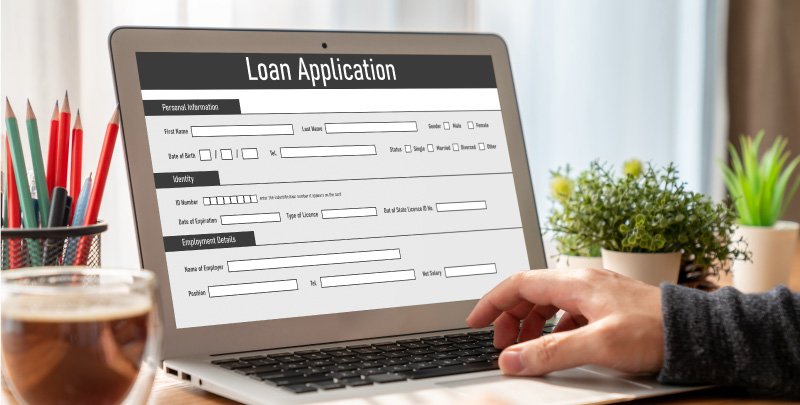In today’s fast-paced world, financial emergencies can arise at any moment, and the need for quick access to funds is more common than ever. Thankfully, online loan approval processes have made it easier than ever to obtain financial assistance. The speed and convenience of applying for loans online have revolutionized the borrowing experience, and many people are turning to online lenders for personal loans, payday loans, and even small business funding.
However, while the ease of online loan applications has made borrowing more accessible, it’s crucial to understand how the online loan approval process works. In this article, we will explore everything you need to know about online loan approval, including what lenders look for, the steps involved, how to increase your chances of approval, and the various types of loans you can apply for online.
Key Takeaway
Online loan approval offers a fast and accessible way to obtain financing, but it’s important to approach the process with a clear understanding of the requirements. Make sure to research lenders, check your credit, and provide complete documentation to enhance your chances of approval. By taking these steps, you can borrow responsibly and avoid financial pitfalls.
What Is Online Loan Approval?
Online loan approval is the process by which lenders evaluate your loan application and determine whether you qualify for a loan. Unlike traditional loans, which often require in-person visits to banks or financial institutions, online loan approval happens entirely over the internet. The process is typically faster and more efficient, but understanding the various steps involved is crucial to ensure a smooth experience.
When you apply for a loan online, lenders use a combination of technology, algorithms, and alternative data to assess your application. This eliminates the need for face-to-face meetings and lengthy paperwork, and instead, lenders can review your information quickly and approve or deny your loan application almost instantly.
Key Factors That Affect Online Loan Approval
Credit Score: While some online loans may not require a credit check, many lenders will still review your credit score to assess your ability to repay the loan. A higher credit score generally increases your chances of approval, as it indicates to lenders that you are financially responsible and less likely to default.
Income and Employment Status: Lenders want to ensure that you have the financial means to repay the loan. They will typically ask for details about your income, including the source and amount, and may also require proof of employment. This helps them evaluate your debt-to-income ratio and your ability to manage monthly payments.
Debt-to-Income Ratio: Your debt-to-income (DTI) ratio is a key metric that lenders use to determine how much of your income is allocated to debt payments. A high DTI ratio may indicate that you’re overburdened with debt, which could make it harder to repay a new loan.
Loan Amount and Purpose: Lenders will also ask about the amount you wish to borrow and the purpose of the loan. For example, personal loans are often used for debt consolidation, medical expenses, or home improvements, while payday loans are typically used for urgent, short-term needs. The loan amount and purpose can influence your approval odds, as lenders want to ensure you are borrowing responsibly.
Bank Account Information: Many online lenders require you to provide your bank account information so that they can disburse the loan funds. This is also used to verify your financial stability, as lenders may review recent transactions and balances to gauge your ability to repay the loan.
Collateral (For Secured Loans): If you’re applying for a secured loan, you may need to provide collateral—such as a car, property, or other valuable assets—in exchange for the loan. This reduces the lender’s risk in case of default and can increase your chances of approval.
The Steps Involved in the Online Loan Approval Process
Application Submission: The first step in the online loan approval process is completing your loan application. This typically involves providing personal information, financial details, and loan requirements. Many online lenders have simplified application forms that you can fill out in minutes.
Loan Review and Assessment: After receiving your application, the lender will review your information to assess your eligibility. Depending on the lender, this process may involve running a credit check or evaluating other factors, such as income, bank statements, and employment details. For some types of loans, the process may be fully automated, meaning that the lender uses algorithms and alternative data sources to make a quick decision.
Approval or Denial: Once your application has been reviewed, the lender will either approve or deny your loan request. If approved, you will receive an offer outlining the loan amount, interest rate, repayment terms, and fees. At this point, you can accept or decline the offer. If denied, the lender may provide feedback on the reasons for the denial, allowing you to improve your chances for future applications.
Loan Disbursement: If you accept the loan offer, the lender will transfer the loan funds to your bank account. Depending on the lender, this can happen within hours, or it may take a few business days for the money to be deposited.Repayment: After receiving the loan funds, you will be responsible for repaying the loan according to the agreed-upon terms. This includes making regular payments on time to avoid late fees, higher interest rates, or damage to your credit score.
How to Improve Your Chances of Online Loan Approval

Maintain a Healthy Credit Score: While some online lenders offer loans without a credit check, having a good credit score increases your chances of approval and can help you secure better loan terms. Regularly check your credit report to ensure that there are no errors, and take steps to improve your credit by paying off existing debts and reducing credit card balances.
Provide Accurate and Complete Information: To avoid delays or denials, make sure that all of the information you provide in your loan application is accurate and complete. Double-check your income, employment details, and bank account information to ensure that the lender can quickly verify your eligibility.
Consider the Loan Type and Amount: Some loans may be more suited to your financial situation than others. For example, if you have a low credit score, you may have better luck with a secured loan, where you can offer collateral. Additionally, borrowing an amount that is reasonable and within your means to repay can increase your chances of approval.
Ensure Stable Income: Lenders want to ensure that you can repay your loan. Having a stable job and a consistent income stream is crucial. If you’re self-employed, be prepared to provide documentation such as bank statements or tax returns to demonstrate your income.
Check Your Debt-to-Income Ratio: Reducing your existing debt load can help improve your debt-to-income ratio, making you a more attractive borrower. A low DTI ratio signals to lenders that you have more disposable income to allocate toward repaying a new loan.
Research Lenders: Not all online lenders are the same, and some may have more flexible approval criteria than others. Research different lenders, read reviews, and compare loan terms to find the best option for your needs.
How Online Loan Approval Can Impact Your Credit Score: What You Need to Know
- Overview: Discussing the effects of applying for online loans on your credit score and how to mitigate negative impacts.
- Topics to Cover:
- How hard inquiries affect your credit score
- The difference between hard and soft credit checks
- How timely repayments can improve your credit score
- How missing payments or defaults can harm your score
- Tips for managing loan applications to minimize credit score damage
A Step-by-Step Guide to the Online Loan Approval Process
- Overview: A detailed, step-by-step breakdown of how the online loan approval process works from start to finish.
- Topics to Cover:
- Submitting the application: Information you need to provide
- How lenders evaluate your application (credit check, income, etc.)
- What happens after you submit your application (approval, rejection, etc.)
- How you’ll be notified of approval or denial
- Loan disbursement and what happens next
Common Mistakes to Avoid During the Online Loan Approval Process
- Overview: Identifying common mistakes applicants make when seeking online loan approval and how to avoid them.
- Topics to Cover:
- Failing to double-check your credit score and loan eligibility
- Submitting incomplete or incorrect information
- Applying for loans that exceed your repayment ability
- Ignoring loan terms, such as APR and fees
- Applying to too many lenders at once and harming your credit score
Understanding the Different Types of Online Loans and Their Approval Processes
- Overview: A deep dive into the various types of online loans (personal, payday, installment, etc.) and how their approval processes differ.
- Topics to Cover:
- Payday loans: How quick approval works and what to consider
- Personal loans: What lenders look for and how to qualify
- Installment loans: How they differ from payday loans in approval terms
- Bad credit loans: How the approval process differs and what is required
- Secured vs. unsecured loans: Approval criteria for both
How to Improve Your Chances of Online Loan Approval with a Low Credit Score
- Overview: Offering strategies for individuals with a low credit score to increase their chances of getting approved for an online loan.
- Topics to Cover:
- How to choose the right lender for low-credit borrowers
- Providing collateral to improve your chances of approval
- Secured loans as an option for low-credit borrowers
- How to use a cosigner to secure loan approval
- Building credit and reducing debt to increase approval odds
The Role of Alternative Data in Online Loan Approval
- Overview: Exploring how online lenders use alternative data to evaluate borrowers and approve loans, especially for individuals with no or poor credit.
- Topics to Cover:
- What is alternative data (bank account activity, utility bills, etc.)?
- How alternative data helps lenders assess risk
- Benefits and challenges of using alternative data for loan approval
- Types of loans that rely heavily on alternative data
- Pros and cons of alternative credit scoring
What Happens After Your Online Loan Is Approved? Understanding the Next Steps

- Overview: Explaining what happens once an online loan is approved, including loan disbursement, terms, and repayment obligations.
- Topics to Cover:
- Receiving loan funds: Direct deposit and other disbursement methods
- Reviewing loan terms: Interest rates, fees, and repayment schedules
- Setting up repayment: Autopay options and deadlines
- What to do if you miss a payment or need to adjust repayment terms
- Understanding your rights and protections as a borrower
How Long Does It Take for Online Loan Approval? Exploring the Timeline
- Overview: A detailed look at the timeline involved in getting an online loan approved and how long you can expect the entire process to take.
- Topics to Cover:
- Application submission: How long it takes to fill out an online loan application
- Processing and evaluation: How long lenders typically take to assess your application
- Instant approval vs. manual review: Why some loans are approved immediately and others take time
- Fund disbursement: How quickly funds are deposited after approval
- Factors that can delay the approval process
Can You Apply for Multiple Online Loans at Once? How It Affects Approval
- Overview: Discussing whether it’s possible to apply for multiple online loans simultaneously and how doing so can impact your approval chances.
- Topics to Cover:
- The potential risks of applying to multiple lenders
- How multiple applications can affect your credit score
- Best practices for applying for multiple loans (staggering applications, targeting different lenders)
- How to avoid applying for loans you don’t need
- Understanding the impact of “loan shopping” on credit ratings
Online Loan Approval and Debt-to-Income Ratio: What You Need to Know
- Overview: A detailed look at the importance of debt-to-income (DTI) ratio in the online loan approval process and how to manage it.
- Topics to Cover:
- What is a debt-to-income ratio and how is it calculated?
- How DTI impacts your loan approval chances
- How lenders use DTI to assess repayment capacity
- Strategies for lowering your DTI before applying for a loan
- The consequences of having a high DTI when applying for loans
The Benefits and Drawbacks of Online Loan Approval for Personal Financing
- Overview: An exploration of the pros and cons of applying for online loans, particularly for personal financing needs.
- Topics to Cover:
- Benefits: Speed, convenience, and accessibility
- Drawbacks: High interest rates, potential for predatory lending
- How online loan approval works for personal loans
- What types of borrowers benefit most from online loans
- Key factors to consider before applying online
How to Choose the Best Online Lender for Loan Approval: A Comparative Guide
- Overview: A comprehensive guide for borrowers on how to select the best online lender based on loan approval criteria and terms.
- Topics to Cover:
- Factors to compare: Interest rates, fees, repayment terms
- The importance of reading reviews and checking lender credibility
- Regulatory aspects: Ensuring lenders are licensed and trustworthy
- Lenders for bad credit vs. good credit applicants
- How to use online loan comparison tools effectively
The Role of Artificial Intelligence in the Online Loan Approval Process
- Overview: Examining how artificial intelligence (AI) and machine learning are transforming the online loan approval process.
- Topics to Cover:
- How AI is used in underwriting and risk assessment
- The efficiency benefits of automated loan approval systems
- Challenges and risks: Bias in AI algorithms
- AI-powered loan prediction models and their accuracy
- How AI is improving accessibility to loans for underserved borrowers
Exploring Peer-to-Peer (P2P) Lending and Online Loan Approval
- Overview: A look at how peer-to-peer lending platforms operate and the loan approval process through P2P networks.
- Topics to Cover:
- How P2P lending platforms work and their differences from traditional online loans
- What lenders look for in P2P loan approval
- Advantages of P2P lending for borrowers and investors
- Risk factors for both borrowers and investors
- A comparison between P2P loans and other types of online loans
Can You Get Approved for an Online Loan with No Credit History?
- Overview: Discussing whether it’s possible to get online loan approval without a credit history and what options are available.
- Topics to Cover:
- How lenders assess applicants with no credit history
- The use of alternative data for applicants without credit scores
- Types of loans available for individuals with no credit history (e.g., no-credit-check loans, secured loans)
- How to build a credit history while applying for loans
- Lender requirements and alternatives for first-time borrowers
The Impact of Online Loan Approval on Your Financial Health
- Overview: Exploring how securing an online loan affects your overall financial health, including long-term implications.
- Topics to Cover:
- The effects of taking on debt from online loans
- Managing loan repayments to avoid financial strain
- How online loans can impact your credit score
- Risk of falling into a debt cycle with multiple online loans
- Strategies for using online loans responsibly for financial growth
What Happens If You Fail to Repay an Online Loan? Consequences and Solutions
- Overview: A deep dive into the consequences of not repaying an online loan and how borrowers can handle the situation.
- Topics to Cover:
- Immediate consequences: Fees, interest rate hikes, and default penalties
- Long-term impacts on credit scores and future borrowing
- Legal actions lenders can take in case of non-payment
- Alternative solutions: Loan extensions, refinancing, or consolidation
- How to negotiate with lenders for a more manageable repayment plan
How to Ensure Your Online Loan Application Is Approved Fast
- Overview: Tips and strategies to streamline the online loan application process and increase your chances of fast approval.
- Topics to Cover:
- Ensuring all required documentation is ready before applying
- Using online loan pre-qualification tools to gauge eligibility
- The importance of keeping a clean credit history for quick approval
- How to select loan terms that are most likely to get approved quickly
- Common pitfalls that slow down the approval process
Is It Safe to Apply for Loans Online? A Guide to Online Loan Security
- Overview: Assessing the safety of applying for loans online and how to protect your personal and financial information during the application process.
- Topics to Cover:
- Identifying secure and trustworthy online lenders
- Best practices for protecting your personal data when applying online
- How to spot predatory lending websites and scams
- What encryption and data protection standards reputable lenders follow
- The role of online loan platforms in ensuring borrower security
The Future of Online Loan Approval: Trends and Innovations to Watch
- Overview: A forward-looking perspective on the future of online loan approval and the technological advancements shaping the industry.
- Topics to Cover:
- The role of blockchain in online lending and loan approval
- How open banking and financial technology are changing lending practices
- The rise of digital-only banks and their impact on loan approval
- The future of alternative data and credit scoring models
- Innovations in loan automation and AI for more accurate risk assessment
How Does Online Loan Approval Differ for Business Loans vs. Personal Loans?
- Overview: A comparison of the approval processes for business loans and personal loans when applying online.
- Topics to Cover:
- Key differences between business and personal loan applications
- Specific requirements for business loan approval (e.g., business plans, cash flow)
- The role of collateral in securing online business loans
- How online lenders assess the financial health of a business versus an individual
- The types of online lenders best suited for business loans
Understanding the Interest Rates on Online Loans and How They Are Determined
- Overview: Explaining how online loan interest rates are determined and how they can vary based on several factors.
- Topics to Cover:
- Factors that affect interest rates for online loans (credit score, loan amount, term length)
- How fixed vs. variable interest rates work in online loans
- The role of the Federal Reserve and market conditions on interest rates
- How to calculate the total cost of a loan including interest
- Strategies to secure loans with the lowest interest rates
Why Some Online Loan Applications Are Denied: Understanding Rejection Reasons
- Overview: A comprehensive look at why some applicants are denied loans and how to improve your chances of approval.
- Topics to Cover:
- Common reasons for rejection (low credit score, high debt-to-income ratio)
- How lenders assess risk and why your financial situation matters
- How to remedy issues that could lead to loan rejection (e.g., improving credit score, reducing debt)
- Can you reapply after a rejection and what to do next
- Tips for submitting a more compelling loan application
How Online Loans Compare to Traditional Bank Loans in Terms of Approval

- Overview: Analyzing the differences between online loan approval processes and traditional bank loans, including eligibility and approval times.
- Topics to Cover:
- Speed and convenience: Online loans vs. traditional banks
- The approval criteria for online loans vs. bank loans (credit score, income, assets)
- Interest rates and fees comparison between online and bank loans
- Flexibility of loan terms: How online loans differ from banks
- How to decide whether to apply for an online loan or a bank loan
How to Prepare for Online Loan Approval: Key Documents and Information You’ll Need
- Overview: A guide to the essential documents and information you’ll need to have ready to increase your chances of a smooth online loan approval.
- Topics to Cover:
- Basic documents needed for loan approval (ID, proof of income, bank statements)
- The role of employment verification and income documentation
- What lenders look for in credit reports and how to improve them
- Preparing for income verification if you’re self-employed
- What to do if you’re missing key documentation
Conclusion
Online loan approval has become a convenient and efficient way to access funding quickly. With minimal paperwork and the ability to apply from the comfort of your own home, online loans are an attractive option for many borrowers. However, understanding the loan approval process is essential to ensure that you make informed decisions and choose the best loan for your financial needs.
By considering factors such as credit score, income, loan amount, and loan type, you can increase your chances of securing a favorable loan. Additionally, maintaining a healthy credit score and providing accurate information during the application process can significantly improve your approval odds.
Read Also :- https://leteheloan.shop/can-you-get-fast-online-loans-with-no-credit-check/
FAQs
What types of loans can I apply for online? You can apply for personal loans, payday loans, installment loans, auto loans, and even business loans online, depending on the lender.
How long does online loan approval take? The approval process can vary. Some lenders offer instant approval, while others may take a few hours or days to review and approve your application.
Can I get an online loan with bad credit? Yes, some lenders offer loans with bad credit or no credit check, though they may come with higher interest rates and fees. You may also need to provide collateral for secured loans.
Do I need a good credit score to get approved for an online loan? While many lenders consider credit scores in the approval process, some online loans do not require a credit check. However, a higher credit score generally improves your chances of securing a loan with favorable terms.
What documents are required for online loan approval? Typically, lenders will ask for proof of income, employment details, bank account information, and identification documents. Some loans may also require additional documentation, such as tax returns or pay stubs.
How can I improve my chances of getting approved for an online loan? To improve your chances of approval, maintain a good credit score, provide accurate information, ensure you have a stable income, and research lenders who specialize in loans for your financial situation.
Are online loans safe? Online loans can be safe if you choose reputable lenders that are properly licensed and regulated. Always read the terms and conditions carefully, and look for red flags such as high fees or unclear terms.





